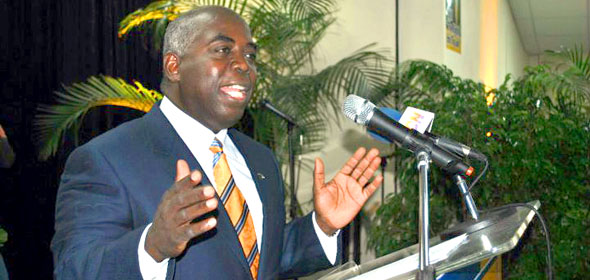VAT PSA 17 from King Of Hearts Media on Vimeo.

Remarks by
Hon. Philip “Brave” Davis, M.P.
Deputy Prime Minister
Minister of Works & Urban Development
at the
Bahamas Energy Security Forum (Sponsored by The Bahamas Chamber of Commerce and Employers’ Confederation)
Wednesday 3rd December 2014, 12:45p.m.
British Colonial Hilton Nassau
One Bay Street
Nassau, N.P., The Bahamas
“The Bahamas Energy Policy and Behaviour”
Salutations
Good Afternoon
As an Opposition Force, the Progressive Liberal Party noted that more than 6,000 families were forced to function daily without electricity, causing untold hardship to families, and that BEC’s rates made the country uncompetitive in many business areas. We promised that, should we be called to serve as Government, we would increase the efficiency of BEC, reduce the cost of electricity to consumers, and reduce reliance on BEC by encouraging conservation measures promoting the use of alternative energy.
Since we came to power, this Government has been diligently engaged in a process to meet its commitment to the Bahamian people. Earlier this year, when I addressed the House of Assembly to debate the budget for Fiscal Year 2014/2015, as Minister with responsibility for the Bahamas Electricity Corporation (BEC), I made the point that BEC remained debt ridden and that we were yet actively engaged in the review of proposals to improve its lot. In the meantime, more frequent blackouts have done little to help us to forget that BEC must do more to bring service value to the Bahamian people.
BEC has taken some steps to reduce costs, including reductions of overtime; however, accounts receivable derived from the private sector (individual and corporate) continue to increase as a number of customers remain unable to meet payment arrangements. Even with revised payment arrangements, many customers continue to default.
All of us will agree that BEC is challenged to meet its goal of providing “safe, reliable and cost effective electricity for customers”. With this vast evidential base, Government is forging ahead to cause the beleaguered Corporation to achieve a position of profitability while reducing the cost of electricity to consumers by way of systemic reform.
As an essential plank toward that process of reform, Government has sought to identify a strong, technically capable and experienced company to manage a new BEC. This management company will have significant autonomy and operate subject to a business plan which addresses the specific objectives of Government. We will seek to cause that business model to basically mirror that which the Nassau Airport Development Company (NAD) has for the management of the Lynden Pindling International Airport (LPIA). Like the airport deal, Government will retain 100% ownership of BEC.
Government will commit to a management company that can guarantee the reduction of the cost billed to the customer to an average of less than 30 cents per KwH within 24 months from commencement of the contract. Given that the current all-in-cost base of BEC per KwH is close to 44 cents, with customers being billed on average 40 cents, this represents more than a 30% reduction. When reflected onto The Bahamas at large, this reduction will save business and residential consumers close to B$200 million.
We are also seeking to have the added benefit of significant savings in fuel cost in-hand. This will reduce the strain on our US dollar reserves.
As we establish the new, strong, and vibrant BEC, consumers will experience great improvements in reliability of the system, including a dramatic reduction in the frequency and duration of power cuts. The new management must introduce best-in-class operational practices, facilitate best-in-class environmental stewardship, including the remediation of existing liabilities, and offer state of the art training for its employees, thereby attaching a solid credit rating to BEC.
That credit rating will have much to do with the proposal to ring-fence the more than $450 million in existing liabilities through a long-term revenue bond structure which has the least possible impact on the cost to the consumer.
The consumers, our employers, remain at the core of this Government’s concern. We promised relief from the high cost of electricity supplied by BEC; and that relief will, in part, come from the management company’s assistance in meeting the Government’s objectives, which are guided by the National Energy Policy, which I am certain was referred to by my colleague Minister of Environment.
All of this must be developed within a progressive legislative framework. It is, therefore, my pleasure, to advise that my Ministry is collaborating with the Attorney General’s Office and BEC to create a new Electricity Act, which provides for new innovations at BEC, enables the Energy Policy, and empowers the Utilities Regulation and Competition Authority (URCA) as the regulator of the sector.
Knowing the desired outcome is one thing. How we get there is another independent conversation. That conversation acknowledges fuel as the most influential factor in the cost equation. The Government of The Bahamas, in consultation with KPMG, have defined the ways in which fuel and other costs will be reduced throughout the supply chain.
The first path to cost reduction is through the implementation of an incentive regime for the management company. This regime prescribes a significant portion of the management company’s remuneration based on achieving service level targets related to fuel efficiency, rationalisation of cost, and significant improvements in reliability, that is, fewer and shorter power cuts. Effectively, the more efficiently and reliably the new BEC operates, the more the manager will get paid.
Secondly, BEC’s credit rating for suppliers must be significantly improved. By giving it a fresh start, paying off all existing liabilities, and introducing stronger financial and operational management practices, the new BEC will be able to secure relatively better prices for fuel and other supplies than it can today.
We also recognise BEC currently relies heavily on Light Fuel Oil (LFO), which is extremely expensive. In the short term, therefore, we intend to dramatically change BEC’s fuel mix. As well, existing diesel generators will be refurbished and improved; and the least efficient engines will be retired. New dual fuel generators will be installed over the first 24 months.
Within that same 24 months, the management company will introduce a new base load dual fuel generation plant in New Providence, minimising the need to use the combustion turbines. The new equipment will be much more efficient and have much lower heat rates as compared to the existing fleet.
While the new generation capacity is being installed, other innovations will be implemented to include sourcing natural gas and more efficient fuels; introducing solar technologies on New Providence; and renewable energy in strategic locations among the Family Islands.
While negotiating the path to an agreement has been protracted, we are working to get it right. We know what we want; and we will get what is determined to be best for the Bahamian people.
I take this time to congratulate the Bahamas Chamber of Commerce and Employers’ Confederation for organising this forum. Indeed, you are fulfilling your mandate to develop, promote and protect trade activity within the context of true tripartite-ism.
VAT PSA 16 from King Of Hearts Media on Vimeo.












